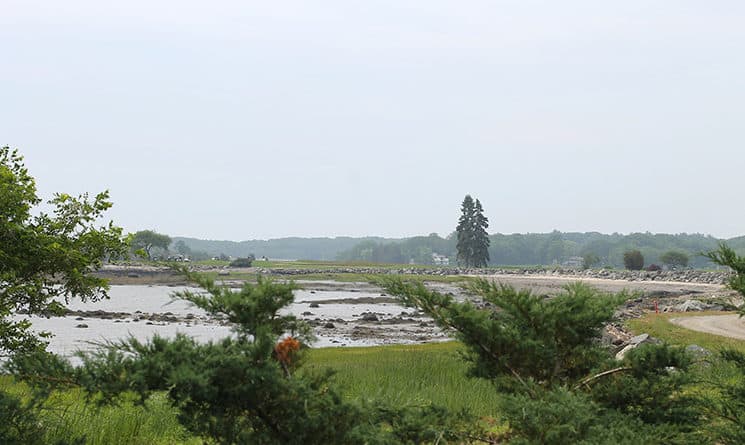Rye
Judge rules in favor of public access at Sanders Point
Sanders Point in Rye is open to the public. That’s according to an Aug. 20 ruling by Rockingham Superior Court judge Marguerite Wageling. Access to the land, which includes a parking area and a small path that leads to Little Harbor Beach, has been in dispute since 2012, when the Wentworth by the Sea Country Club erected a fence and placed shrubs and boulders in front of the parking area on Route 1B.
Since then, Rye resident Robert Jesurum has been challenging the Wentworth and its owner, William Binnie, in court to restore public access to Sanders Point. In November 2014, Wageling ruled the public had the right to use Sanders Point to access the beach. The new ruling comes after a trial last June that focused on how the public can access the land.
“We won a major victory,” Jesurum said.
As part of the ruling, the court ordered Binnie to remove the bushes and boulders that were placed in front of the parking lot, grade the parking lot so that it can accommodate four parking spaces, and clear the pedestrian path to the beach. The judge ordered the Wentworth to pay for all associated costs. The ruling also encourages the Wentworth to post signs to “delineate the limits of public areas and dissuade members of the public from interfering with golf course operations.”
According to the ruling, the public has a right to park at and access Sanders Point, throughout the year. Wageling rejected Binnie’s defense that access to the area was contingent on permission from Wentworth staff. Regarding Binne’s argument that he closed access to Sanders Point because of “litter and dog feces” left at the beach and because beachgoers were walking on the golf course, Wageling wrote that “litter, dog feces, and unintentional trespass onto the golf course are minor, technical, and remediable problems that cannot justify wholesale termination of the parking and access easments.”
In the ruling, Wageling writes that Sanders Point has been used to access Little Harbor Beach since at least the 1950s, and that the public consistently used the area, and the parking lot, for the last seven decades for recreation (and, according to one witness, as a make-out spot). “If anything, the public’s use of Sanders Point increased in the 1990s and 2000s,” the ruling states.
While Wageling’s ruling commended the witnesses testifying in support of Jesurum’s case, the judge had a less than favorable opinion of the defense’s witnesses, pointing out that one of the witnesses is also employed by Binnie.
The ruling does place one limit on access: the public can park at Sanders Point from dawn to dusk, and campers, RVs, and trailers are not allowed.
The ruling does not grant Jesurum attorney’s fees; he said he’s racked up about $61,000 in legal bills for the case. The Coastal Conservation Association of New Hampshire has set up a legal fund to help cover the cost of Jesurum’s attorney’s fees.
Binnie and the Wentworth have 10 days to ask for a reconsideration of the judge’s ruling; if that is not granted, they have 30 days to file an appeal. Jesurum said that if Binnie and the Wentworth do appeal, he and his attorney plan to ask the court to rule that the Wentworth must proceed with removing the boulders and shrubs.
“This has been going on for three years and it’s really not right,” he said.
Though he’s happy with the outcome, Jesurum said he’s disappointed the town of Rye and the state attorney general’s office never stepped in to prevent what he called a “land grab.”
“I think it’s totally unforgivable. I think the state and town should examine themselves,” he said.
— Larry Clow
Dover
Citizen petitions move forward
A pair of citizen petitions for ballot initiatives that would require the city attorney to report to the city council rather than the city manager and restore ward-based voting for school board elections are moving forward, and residents could vote on the proposed changes in November.
Ward 5 city councilor Catherine Cheney, who organized the petition drive, said volunteers collected more than 1,700 signatures for the city attorney petition and 1,600 signatures for the school board petition.
The ballot measures were first proposed in May; however, the city council voted against holding a public hearing on the measures, which effectively killed the proposals. Soon after, Cheney and a handful of supporters started the petition drive.
According to Cheney, the initiatives will result in more transparency and better representation for Dover residents. “Under the Constitution of New Hampshire, I’m a substitute for (residents) … and we, the elected people who represent you, don’t have a city attorney; we have a city manager, and he has a city attorney,” she said.
The next stop for the ballot initiatives is a public hearing with the city council on Wednesday, Sept. 9 at 7 p.m. A location for the hearing hasn’t been determined yet, though Cheney said it will likely take place either at city hall or the McConnell Center, located across from city hall at 61 Locust St.
Cheney will also host a public meeting about the ballot initiatives on Thursday, Sept. 3 at 6:30 p.m. at Riverside Rest Home at 276 County Farm Road. — LC
Durham
Town council candidates wanted
Durham officials are looking for a resident to fill an upcoming vacancy on the town council. Councilor Julian Smith announced in August he would be stepping down from the council after 10 and a half years by Sept. 21 due to family commitments.
Under the town charter, the council will appoint a resident to fill the vacancy until the next election in March of 2016. Residents interested in the position must fill out an application form, located at bit.ly/1LRnqSi, and submit it to jberry@ci.durham.nh.us. — LC

